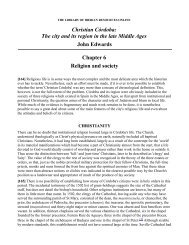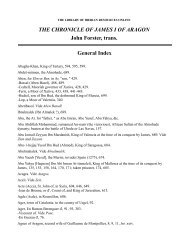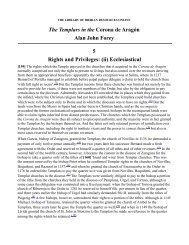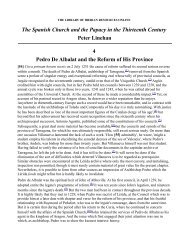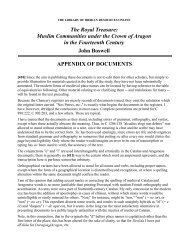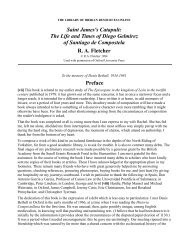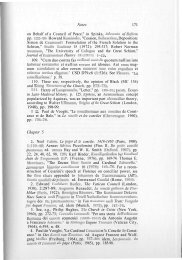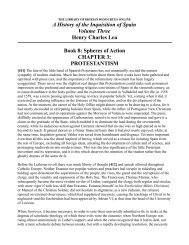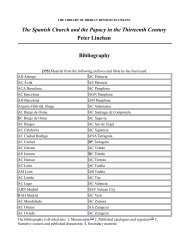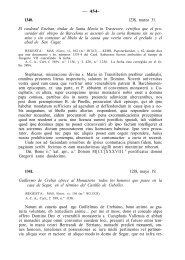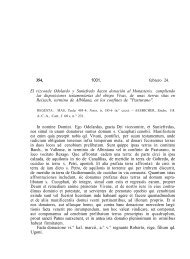Chapter 12 - The Library of Iberian Resources Online
Chapter 12 - The Library of Iberian Resources Online
Chapter 12 - The Library of Iberian Resources Online
Create successful ePaper yourself
Turn your PDF publications into a flip-book with our unique Google optimized e-Paper software.
(storehouse, deposit). (27)<br />
5) almatzem, "divisor" (Gandia), Arabic al-miqsam. Not a common term in Spain but <strong>of</strong> wide diffusion<br />
in Islam, as far east as Persia. (28)<br />
6) azumbre, a water measure (Novelda, Elche), Arabic al-thumn, "one-eighth." (29)<br />
7) dula, "turn" (Gandia, Elche); also a water measure synonymous with hila (Alicante), Arabic daula.<br />
Another term found both in the Yemen and the Sahara. (30)<br />
8) jarique, noun, or verb jaricar, "to unite various hilas <strong>of</strong> water" bought at auction in order to irrigate<br />
with a greater body <strong>of</strong> water and to transport it over a long distance with minimal loss (Lorca); Arabic<br />
sharîk, "a partner." An important reminiscence <strong>of</strong> communal irrigation practices among Muslim<br />
irrigators. (31)<br />
9) jarro, a water measure (Lorca, Jumilla), Arabic jarra, "jug." In Lorca and Jumilla the jarro is equal<br />
to one-half hour <strong>of</strong> water. It takes its name from the clepsydra (water clock), a vessel with a hole in the<br />
bottom which was the standard time measure for irrigation in the North African oases and in southern<br />
Spain. <strong>The</strong> word is frequently found in thirteenth-century Romance texts, indicating its adoption after<br />
the conquest <strong>of</strong> Lorca and the Murcian region. (32)<br />
10) martava, "turn" (Alicante, Novelda), Arabic martaba. (33)<br />
11) merancho, "drainage ditch" (Murcia), Arabic marj. (34) <strong>The</strong> connection between drainage and<br />
marjals is clear. Drainage <strong>of</strong> marshland was an operation described largely in arabisms.<br />
<strong>12</strong>) rafa, "canal check" (Murcia), Arabic raf', "raising up." (35) An interesting example <strong>of</strong> an arabism<br />
that describes a function different from that expressed by its common [223] Romance synonym,<br />
parada. <strong>The</strong> canal check (<strong>of</strong>ten simply a board placed across a canal) serves both to stop the flow (the<br />
meaning <strong>of</strong> parada, from panarse, to stop) in order to divert water and to raise the level (the meaning<br />
<strong>of</strong> rafa).<br />
13) sistar, "divisor" (Vall de Segó). Corominas has suggested a derivation from the Latin sistere (to<br />
stop); (36) but this must be questioned because irrigation terms are usually precise as to function, and a<br />
sistar divides water (its more usual synonym is partidor) rather than stopping it. Since the Vall de Segó<br />
had a substantial Muslim population, it seems proper to seek a derivation from the Arabic root sh-t-r,<br />
"to divide into two equal parts."<br />
14) tahulla, a measure <strong>of</strong> land (Murcia) but also a measure <strong>of</strong> water equivalent to one hour (Lorca),<br />
Arabic tahwila, "field." (37)<br />
<strong>The</strong> foregoing data permit several generalizations concerning the frequency and function <strong>of</strong> arabisms in<br />
the technical vocabulary <strong>of</strong> medieval irrigation: 1) <strong>The</strong> Arabic word and the arabism usually have the<br />
same meaning. (38) Agricultural terms especially are conservative by nature and tend to retain the<br />
original meaning so long as the use <strong>of</strong> the object is the same. 2) Romance synonyms are likely to be<br />
literal translations <strong>of</strong> the original Arabic meaning: thus resclosa is the equivalent <strong>of</strong> açut, from sadda,<br />
"to close"; partidor is the synonym <strong>of</strong> almatzem, from qasama, "to divide." 3) When all the synonyms<br />
describing a single phenomenon are arabisms, there is a strong presumption that the concept or<br />
technique was unknown or undeveloped outside <strong>of</strong> the Islamic orbit or, at any rate, was very intimately<br />
associated with the Islamic style <strong>of</strong> irrigating: for example, the words for turn (dula, ador, martava), for<br />
return ditch (almenara, azarbe, merancho), for cistern (safareig, aljup), and for water wheel (sinia,<br />
noria).



